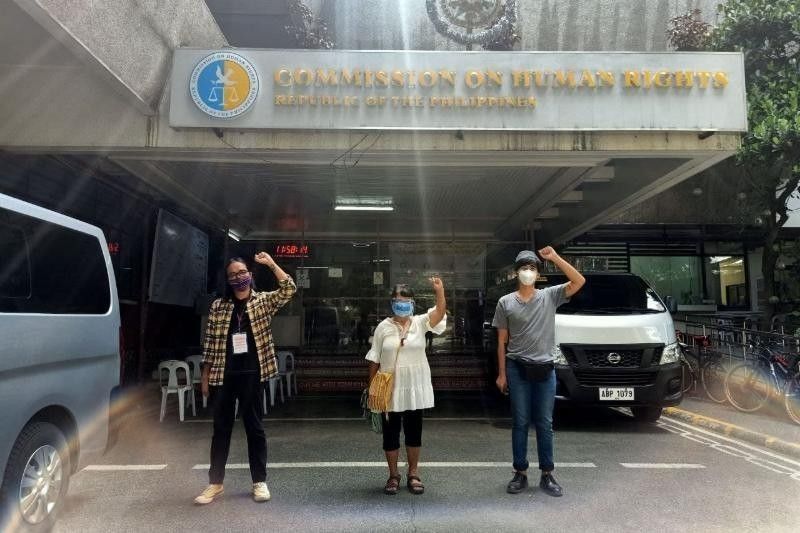Lagman: NTF-ELCAC attack on rights defenders protection bill is best argument for it

MANILA, Philippines — A bill seeking to provide protection to human rights defenders will not hamper the government's efforts against terrorism despite claims by its anti-communist task force, Rep. Edcel Lagman (Albay) said.
Lagman, principal author of the bill, added that the National Task Force to End Local Communist Armed Conflict's objections and its "hyperbolic assault of red-tagging the authors and supporters of HB No. 77, as well as authentic Human Rights Defenders" shows why the bill should be passed into law.
He said the Anti-Terrorism Act, the Anti-Money Laundering Law and the Terrorism Financing Prevention and Suppression Act of 2012 will still "remain enforceable in the proper cases with due respect and protection to authentic (human rights defenders)."
He added that the task force is "hallucinating [that] an increased communist-terrorist menace" will come if the bill is passed into law.
RELATED: Manila court allows Nasino, 2 other activists to post bail
Lagman made the statement in response to rehashed arguments that the task force raised in calling for the junking of the Human Rights Defenders bill, which has been approved at the committee level at the House of Representatives.
NTF-ELCAC representatives claimed Monday that the bill would "make several laws to combat terrorism...as mere toothless paper tigers." It also claimed that making it illegal to subject rights defenders to acts of intimidation, reprisal and derogatory labeling was "unwarranted and impermissible, because of the classification in favor of human rights defenders is not justified."
This is not the first time that the NTF-ELCAC cited the 1987 Constitution and measures related to crime and terrorism to block the passage of a bill protecting human rights defenders.
It also used similar arguments in November 2021 to oppose an earlier version of the bill during the 18th Congress.
Who is considered a rights defender?
The task force claimed that the bill was unclear in its definition of human rights defenders and claimed they are no different from other advocates.
Lagman said that the definition of human rights in the bill "is clear and definitive" as it used the same definition in the Model Law for Recognition and Protection of Human Rights Defenders, an international document created in 2016 in collaboration with more than 500 human rights defenders in the world and endorsed by nearly 30 of the world's leading human rights experts.
HB 77 defines a human rights defender as "any person who, individually or in association with others, acts or seeks to act to protect, promote or strive for the protection and realization of human rights and fundamental freedoms and welfare of the people at the local, national, regional, and international levels."
The International Service for Human Rights, which developed the Model Law, has lauded House Bill 77 for being "nearly identical" to its own Model Law protecting human rights defenders.
The international body’s assessment of HB 77 stated that it is "an almost verbatim transcript of the Model Law, going further in some aspects" and that the law is "comprehensive, complying with the standards set by the Model Law."
While the task force has criticized the measure for supposedly giving “special and differentiated treatment” to human rights defenders, the United Nations adopted its own recommendations for protecting human rights defenders as far back as 1998 to "recognize the paradigm shift" on how the defense of human rights involves "us all," even people outside government.
"The emergence of HRDs is both an indictment and a symptom of the failure and neglect of the government to fully protect, promote, and fulfill human rights. HRDs are surrogate defenders due to government’s default in its primary obligation as the official protector of human rights," Lagman said.
RELATED: Transparency International: Governments in Asia Pacific restricting civic space
Lagman added: "In the long global campaign for the promotion, protection and fulfillment of human rights, (human rights defenders) have emerged as a distinct class who need protection from harassment and atrocities committed by agents of the State."
He added that there is "no class legislation" in giving special protection to human rights defenders as proposed in the bill.
The UN Declaration on Human Rights Defenders, which the Model Law – and subsequently HB 77 — is patterned after, also "does not create new rights but instead articulates existing rights in a way that makes it easier to apply them to the practical role and situation of human rights defenders."
'NTF-ELCAC objections best argument for rights defenders protection bill'
While the anti-communist task force also claimed that HB 77 would "encroach upon the powers given to the Commission of Human Rights" by forming the Human Rights Protection Committee, Lagman said that the committee would merely augment the jurisdiction of the CHR.
Under HB 77, a CHR commissioner would act as chair of the Human Rights Protection Committee and appoint its members. CHR commissioners are fixed-term appointees picked by the president.
The human rights body in 2022 threw its support behind the passage of HB 77 while calling to end the dangerous practice of red-tagging — labeling people and organizations as rebels, terrorists and enemies of the state — human rights defenders, activists and other advocates.
Lagman added that the NTF-ELCAC’s "hyperbolic" objections to the bill and to the work of human rights defenders "is the best argument for the immediate enactment of the law protecting (human rights defenders) from the intimidation, harassment, and liquidation by agents of the State."
- Latest
- Trending


































